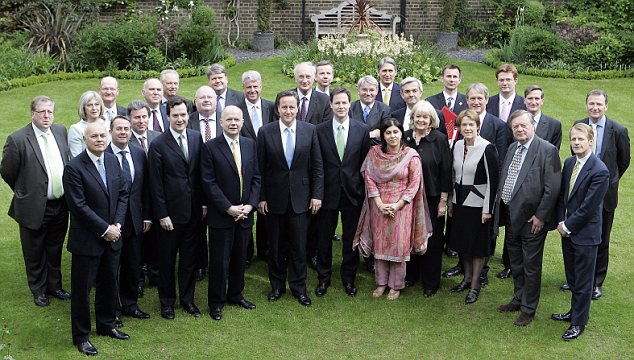The Equality Dilemma
written for The Spectator, 15 May 2010

The Conservative/Lib Dem Cabinet meeting in Downing Street today
Spare a thought for poor Theresa May. Judging by the reaction so far, she now faces the unenviable task of shouldering almost everyone’s preconceptions about Tory women in government – with Caroline Spelman, Baroness Warsi and the lower-profile Cheryl Gillan for back-up. She will no doubt continue to disappoint feminists and irritate reactionaries, and she will do so while responsible for the notoriously unwieldy Home Office, which has rapidly taken over from the Department of Health as the ministry where political careers go to die.
Representation in politics does matter. It is not unreasonable to claim, as Katharine Viner did in Thursday’s Guardian, that “democracies simply don’t work unless they represent those they govern”. At the very least, it is politically dangerous for a government to appear too alien from its electorate. But it is also true that ministers with a variety of experiences of the world have empathy for different sections of society. Through no fault of their own, men are less likely to understand the visceral response felt by women when hearing about legal proposals to treat “acquaintance rape” as “less traumatic” than “stranger rape”. Likewise, no women can fully appreciate the despair felt by many men at the numbers of fathers who are denied access to their children.
Yet Tories know better than anyone that tick-box diversity should never hold sway over real qualifications. This is a reality that feminists should embrace: the cause not only needs women in power, but needs women to be seen earning respect and promotion on their own merits. And when Cameron was picking his cabinet, he simply didn’t have many senior women from whom to pick, in either party. This is a problem for the Lib Dems as much as the Tories, but the problems can only begin to be addressed much lower down the career chain.
The real test of Cameron’s commitment to women’s leadership in the Conservative Party was always going to be the number of women he welcomed as junior ministers. In years to come, he’ll have a crop of bright women to nurture into government: Elizabeth Truss and Louise Bagshawe stand out as new MPs with considerable experience, while at the younger end, Charlotte Leslie and Chloe Smith are already making an impression. They’ll have to wait their turn, however. By the end of Wednesday afternoon, Cameron was facing awkward reminders of his promise that a third of government ministers in a Conservative government would be women. But it is wrong to attack him for breaking this promise. As with the Party’s entire manifesto, Cameron has made many promises to be carried out under a Tory government. But he is not now in charge of a purely Tory government.
The irony is, of course, that cabinet combining Lib Dems and Tories is one that constitutes real diversity. Organizations that privilege “diversity” at the cost of all other considerations run the risk of understanding diversity in very limited terms – a fact demonstrated by this absurd graphic from the Guardian, which allows readers to “sort the cabinet” by their most important qualities, when those qualities are … sex, ethnicity and educational privilege. It would be far more fun, not to mention informative, to be able to sort ministers by, say, their ideology – imagine a visual representation of the cabinet by Euroscepticism. But that might be too relevant to real politics for the Guardian to stomach.
In the end, what should be most worrying for equalities campaigners is that David Cameron seems to think the job of Minister for Women and Equalities can be slotted into the spare time May has while not busy with one of the great Offices of State. If Cameron is really committed to transforming his own party and his government from the bottom up, he will soon learn that promoting equality is a full time job.




